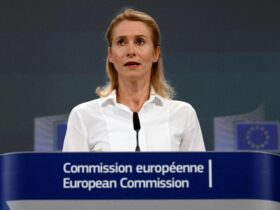Germany is bracing for digital threats in the run-up to the general election.
With the country expected to elect a new parliament on February 23, authorities and researchers are raising concerns about the potential impact of hack-and-leak operations and disinformation campaigns aimed at swaying public opinion or sowing division ahead of the vote.
In a recent analysis, Germany’s domestic intelligence agency warned of “attempts by foreign states to exert influence.”
This warning was echoed by Claudia Plattner, the president of Germany’s cybersecurity agency, the Federal Office for Information Security (BSI), who told reporters that “there are forces inside and outside Germany that have an interest in attacking the election process and disrupting the democracy order.”
The snap election, held under a compressed timeline, not only poses logistical challenges for authorities — it also comes at a time of heightened political tensions.
“There are various issues, from the economy to the geopolitical situation, that are dividing society,” Josef Lentsch, the CEO of the Political Tech Summit conference, which will take place in Berlin at the end of January, told DW.
“Populists and extremists are particularly good at exploiting these social divides,” he said.
A threat from outside and within
Cyberattacks on prominent individuals and organizations may pose a significant threat to the election, experts say. Once obtained, sensitive data can be used in coordinated “hack-and-leak” operations, in which stolen material — often altered or taken out of context — is released to undermine the credibility of political candidates or parties.
“Against the backdrop of the Russian war of aggression against Ukraine, Russia probably has the greatest and most obvious interest in influencing the election in its own favor,” the intelligence agency BfV warned in late November.
But domestic actors operating from within Germany pose an equally significant risk to the integrity of the election, cautioned technology expert Lentsch.
“The public sphere has evolved,” he said. “Anti-democratic actors are now using channels on messaging platforms like WhatsApp and Telegram, as well as social media platforms like TikTok, to circumvent the filtering functions of traditional media and other trusted entities.”
Both extremist fringe actors and populist parties like the far-right Alternative for Germany (AfD) have spent years building this “alternative digital infrastructure,” he added: “As a result, they now have almost a decade’s head start over other actors, such as the established parties.”
Lessons from Romania
The political firepower of this kind of digital infrastructure was demonstrated in the first round of Romania’s presidential election, with the surprise victory of nationalist Călin Georgescu, a far-right admirer of Russian President Vladimir Putin.
On Friday, December 6, Romania’s Constitutional Court annulled the results after Romanian President Klaus Iohannis had declassified security documents. The documents alleged that Russia had run a campaign involving thousands of social media accounts on platforms such as TikTok and Telegram to promote Georgescu.
“Romania is an EU country. What happened there can happen elsewhere, including in Germany,” Lentsch warned.
The rise of ‘AI propaganda’
In Germany, no party has built a larger “digital infrastructure” to push its narratives than the AfD, according to Katja Muñoz, a research fellow at the Center for Geopolitics, Geoeconomics, and Technology at the Berlin-based think tank German Council on Foreign Relations.
Within this network of social media accounts, multiple accounts interact with each other to prompt the platforms’ algorithms to amplify the reach of posts, she told DW: “It’s an orchestrated move to push the same narrative.”
At the same time, new so-called “generative AI” programs now allow parties and individuals to create posts — from text to images and even video — much faster than before. Officials from across the political spectrum have begun using the technology to create illustrations for social media posts, for example.
And yet, “in Germany, we see that the party that spreads by far the most AI-generated content is the AfD,” Muñoz said, referring to an analysis she conducted around the European elections, as well as regional elections in 2024.
“This content is not necessarily false, but it’s misleading and meant to confirm existing beliefs — it’s AI propaganda,” she said, citing the example of a 78-second AI-generated video released by the AfD in September, just days before a regional election. The clip depicted scenarios in which people who were mostly blonde and blue-eyed were contrasted with people of color, who were shown in negative contexts.
How to protect the vote?
A multi-pronged approach is needed to protect the integrity of Germany’s campaign and election, experts say.
To counter the threat of cyberattacks, the BfV intelligence agency has formed a special task force to monitor threats. The cybersecurity agency BSI is offering online seminars to candidates and parties to help them secure their devices and online accounts against cyber intruders.
“Normally we would have liked to do this on site and in person, but now we have to switch to webinars simply because we don’t have as much time to prepare as we thought,” BSI President Plattner told public radio Germany radio.
With only about two and a half months remaining until the expected election day, technology expert Lentsch stressed that “it is all the more important that civil society, political actors and state authorities engage in dialogue, especially as the period leading up to the elections has shortened.”
Researcher Muñoz added that authorities should also step up efforts to raise awareness about disinformation and AI-generated propaganda: “Officials should explain to people how public opinion is being manipulated and how fringe views are being pushed to the center of the debate.”
Edited by Rina Goldenberg
While you’re here: Every Tuesday, DW editors round up what is happening in German politics and society. You can sign up here for the weekly email newsletter Berlin Briefing.






Leave a Reply